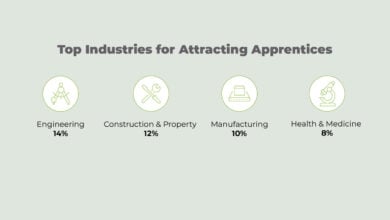Why become an apprentice?
Trades apprenticeships are a popular way to get into the construction industry. For individuals, they’re a way to earn whilst you learn, and apprenticeships also benefit employers by bringing in new talent and skills.
There are thousands of apprenticeship opportunities in the UK. If you’re thinking of applying for trades apprenticeships, check out some of the benefits of becoming an apprentice below.
High job satisfaction

Job satisfaction plays a big part in our day-to-day lives. When you work in a positive and supportive environment, you’ll likely be more motivated to do your job – and enjoy it too!
87% of construction apprentices said that they felt more satisfied in their role after starting their apprenticeship, according to government data.
Good pay progression

Your pay increases as you progress through your apprenticeship. Whilst you’re entitled to at least the apprentice rate when you first start, and then the minimum wage after the first year of your apprenticeship, many apprentices get more than that from the start. Phil, a heating and plumbing apprentice, got £12 per hour from his first day – find out more in our video: Apprenticeships in construction: how Dyno support plumbing talent.
After you’ve finished your apprenticeship, it’s likely that you’ll see your salary rise – recent research found that three in every five apprenticeship finishers got a pay rise and/or a promotion straight afterwards. Most of those people said that this was due to, or helped by, their apprenticeship.
Increased employability

Apprenticeships are designed in conjunction with employers, meaning you can be sure that you’re gaining the skills and knowledge that real businesses are looking for. The employment rate is extremely high amongst people that have completed trades apprenticeships. 98% were in work post-apprenticeship, with the majority being full-time (Gov.uk).
Improved career prospects

Naturally, you can expect to pick up specific skills depending on the trade that you’re doing your apprenticeship in. You could even learn skills that allow you to work across multiple trades, like 80% of tradespeople on Rated People do. But, you’ll also earn loads of other hard and soft skills throughout the course of your apprenticeship. These include IT, communication, teamwork, maths, and English skills. These are all transferable skills that will help your career to progress once you move on from your apprenticeship.
As a result, you’ll have lots of skills that you can use to get a promotion, start up your own business, get a new job at another company or move into further education – the opportunities are endless.
Supportive working environment

Your time on your apprenticeship will be split between working on the job and studying at a training centre. In both cases, you’ll learn from those that are the best in your trade. An apprenticeship is all about learning, and you’ll get support throughout.
Less entry requirements

Anyone that’s 16 and over can do an apprenticeship; there’s no maximum age limit, which makes it a viable option for experienced workers looking to change careers.
Plus, you don’t necessarily have to have qualifications to do a higher level apprenticeship. Some Intermediate and Advanced level apprenticeships don’t ask you for any academic qualifications to take part. Check the job description for any trades apprenticeships that you’re applying for, to see if there are any entry requirements.
Got questions about becoming an apprentice? Check out 15 FAQs in Rated People’s guide to apprenticeships for applicants.




